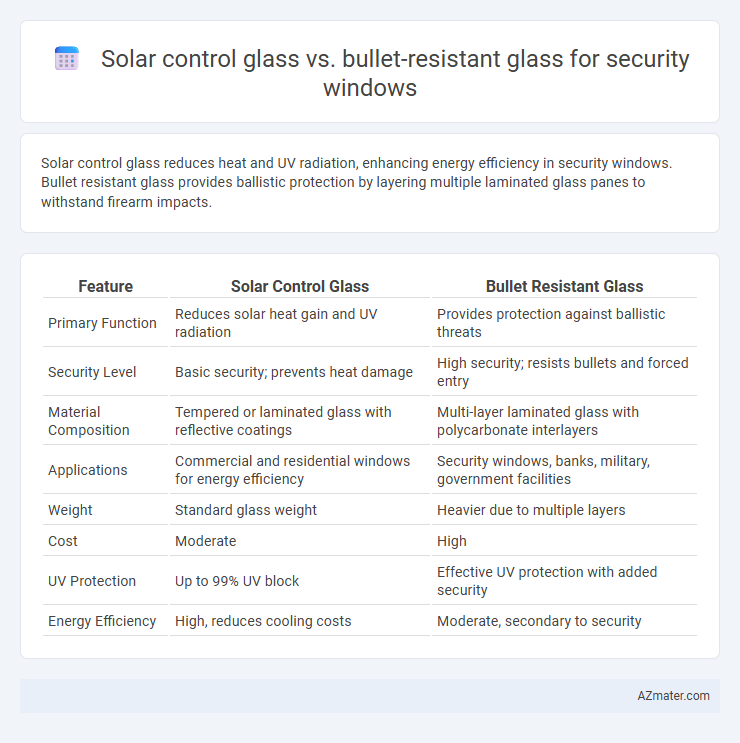Solar control glass reduces heat and UV radiation, enhancing energy efficiency in security windows. Bullet resistant glass provides ballistic protection by layering multiple laminated glass panes to withstand firearm impacts.
Table of Comparison
| Feature | Solar Control Glass | Bullet Resistant Glass |
|---|---|---|
| Primary Function | Reduces solar heat gain and UV radiation | Provides protection against ballistic threats |
| Security Level | Basic security; prevents heat damage | High security; resists bullets and forced entry |
| Material Composition | Tempered or laminated glass with reflective coatings | Multi-layer laminated glass with polycarbonate interlayers |
| Applications | Commercial and residential windows for energy efficiency | Security windows, banks, military, government facilities |
| Weight | Standard glass weight | Heavier due to multiple layers |
| Cost | Moderate | High |
| UV Protection | Up to 99% UV block | Effective UV protection with added security |
| Energy Efficiency | High, reduces cooling costs | Moderate, secondary to security |
Introduction to Security Window Solutions
Security window solutions incorporate materials designed to enhance protection and energy efficiency, with solar control glass and bullet resistant glass serving distinct purposes. Solar control glass reduces heat gain and glare by filtering solar radiation, improving indoor comfort and energy savings. Bullet resistant glass provides a high level of impact resistance, designed to withstand ballistic threats and enhance security in critical environments.
Overview of Solar Control Glass
Solar control glass is designed to reduce heat and glare by reflecting and absorbing solar radiation, enhancing energy efficiency in buildings. It improves indoor comfort by minimizing ultraviolet (UV) exposure and helps lower cooling costs through thermal insulation properties. Unlike bullet resistant glass, solar control glass prioritizes energy management rather than ballistic protection.
Overview of Bullet Resistant Glass
Bullet resistant glass is engineered with multiple layers of laminated glass and polycarbonate to absorb and dissipate the energy from ballistic impacts, providing enhanced protection against firearm threats. Unlike solar control glass, which primarily reduces heat and UV radiation, bullet resistant glass offers a critical security function by resisting penetration from bullets and preventing forced entry. Ideal for high-security installations such as banks, government buildings, and secure facilities, bullet resistant glass meets stringent standards to ensure occupant safety while maintaining visibility.
Core Differences: Purpose and Function
Solar control glass is designed to reduce heat and glare by filtering ultraviolet and infrared rays, improving energy efficiency and comfort in buildings. Bullet resistant glass is engineered to provide high-level protection against ballistic threats by combining multiple layers of laminated glass and polycarbonate materials to absorb and dissipate impact energy. The core difference lies in their primary purpose: solar control glass focuses on environmental and energy benefits, while bullet resistant glass prioritizes security and life safety against projectile attacks.
Security Features Compared
Solar control glass enhances security by reducing glare and heat, thus improving visibility and occupant comfort, but it offers only basic resistance against impact and forced entry. Bullet resistant glass is engineered with multiple layers of laminated glass and polycarbonate, providing superior protection against high-velocity projectiles and ballistic threats. For security windows requiring maximum defense against armed attacks, bullet resistant glass remains the optimal choice due to its certified ability to absorb and dissipate energy from bullets.
Energy Efficiency and Comfort
Solar control glass enhances energy efficiency by reflecting infrared radiation, reducing heat gain and lowering cooling costs, while maintaining natural daylight for indoor comfort. Bullet resistant glass prioritizes security by combining multiple layers of laminated glass and polycarbonate materials to absorb and disperse impact energy but may reduce light transmission and increase indoor heat retention. For security windows, choosing solar control glass optimizes thermal comfort and energy savings, whereas bullet resistant glass provides vital protection with potential trade-offs in energy efficiency and comfort levels.
Aesthetic and Design Considerations
Solar control glass offers sleek, reflective surfaces that enhance building aesthetics by reducing glare and heat while maintaining natural light, making it ideal for modern, energy-efficient designs. Bullet resistant glass, typically thicker and layered with polycarbonate interlayers, presents a more utilitarian appearance but can be integrated seamlessly with architectural elements when framed and finished thoughtfully. Both options allow customization in tint, thickness, and coatings to balance security needs with aesthetic appeal in security window applications.
Installation and Maintenance Requirements
Solar control glass requires minimal installation adjustments, often fitting standard window frames without additional structural reinforcement, reducing overall setup time and costs. Maintenance involves routine cleaning to preserve its energy efficiency properties, with no special treatments needed beyond standard window care. Bullet-resistant glass demands precise installation with reinforced frames and secure sealing to maintain integrity, and its maintenance includes regular inspections for cracks or impact damage to ensure sustained security performance.
Cost Comparison and ROI
Solar control glass typically costs between $25 to $50 per square foot, offering energy savings by reducing heat gain and lowering cooling bills, which can lead to a return on investment within 3 to 5 years. Bullet resistant glass ranges from $70 to $150 per square foot, providing enhanced security against ballistic threats but involves higher upfront costs and longer ROI periods. Choosing between the two depends on balancing initial expenditure against specific security needs and energy efficiency benefits.
Choosing the Right Glass for Security Needs
Solar control glass reduces heat and glare by reflecting solar radiation, helping maintain indoor comfort and energy efficiency, while bullet resistant glass offers multiple layers of laminated materials designed to absorb and stop projectiles. For security windows, selecting bullet resistant glass is critical when protection against ballistic threats is required, whereas solar control glass suits environments prioritizing thermal performance and UV protection. Assess risk factors such as intrusion level, environmental conditions, and building codes to determine the optimal glass that balances safety and energy efficiency.

Infographic: Solar control glass vs Bullet resistant glass for Security window
 azmater.com
azmater.com